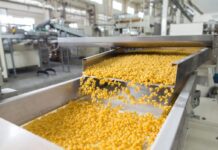
Australia is set to bolster the credibility of its agricultural and food product claims through the introduction of an innovative isotopic data platform developed by four prominent research organisations in the country.
This collaborative initiative, uniting CSIRO, Geoscience Australia, the Australian Nuclear Science and Technology Organisation (ANSTO), and the National Measurement Institute (NMI), aims to provide verifiable evidence for the origin and environmental credentials of Australian food products.
According to CSIRO, isotopes, distinctive chemical signatures often referred to as ‘fingerprints,’ play a pivotal role in tracing the geographical origin and production methods of food.
The accuracy of isotopic data serves as compelling evidence, facilitating the verification of product credentials and provenance, the agency said in a news release.
This is particularly crucial for meeting market demands, such as the increasing requirements for low-emission or deforestation-free commodities in Europe.
Co-invested with the Australian Research Data Commons (ARDC), the collaboration seeks to unify disparate data held by each organisation into a comprehensive national collection.
Speaking at the International Conference on Food Analysis in Melbourne, Dr Nina Welti, CSIRO’s trusted supply chains expert, highlighted the wealth of public isotopic data within these organisations that, when combined, can effectively address Australia’s export challenges.
“Isotopes not only tell us about food production, they also help us to better understand environmental factors such as soil nutrients and groundwater flows,” Dr Welti explained.
“Connecting these rich databases in a way that’s trusted and shareable is key to supporting research for the public good, as well as commercial outcomes for Australia’s agriculture, food and water systems,” she noted.
Led by CSIRO through its Trusted Agrifood Exports Mission, the effort also aims to integrate datasets and insights throughout the supply chain, enhancing Australia’s access to international markets.
The agency reported that the agricultural and food export trade is a linchpin of the Australian economy, contributing approximately $80 billion annually.
Verification tools become instrumental in maintaining existing export markets and accessing new, high-value markets.
For instance, CSIRO’s role in undertaking greenhouse gas assessments for Australian canola ensures compliance with the European Union’s targets, making it eligible for use in biofuels.
Tim Stobaus, NMI’s Analytical Services manager, underscored the increasing market demand for sustainable agricultural practices.
“Leveraging a stable isotope data platform can support innovation and insights to differentiate Australian products based on sustainable practices at the farm gate,” Stobaus stated.
“This data can assist in the evaluation of trade-offs and decisions in terms of yield, quality and management practices so that Australian agricultural commodities can reach previously unrealised premium markets and diversify their offerings to meet changing demands,” he added.



















